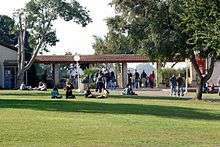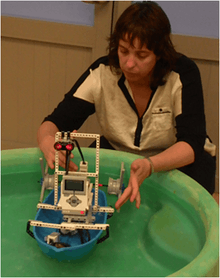Ruppin Academic Center
| Ruppin Academic Center המרכז האקדמי רופין | |
|---|---|
 | |
 Ruppin Academic Center | |
| Coordinates: 32°20′35″N 34°54′43″E / 32.34306°N 34.91194°ECoordinates: 32°20′35″N 34°54′43″E / 32.34306°N 34.91194°E | |
| District | Central |
| Council | Hefer Valley |
| Population (2015)[1] | 480 |
| Website | www.ruppin.ac.il |
Ruppin Academic Center (Hebrew: המרכז האקדמי רופין), also known as Ruppin College, is a college and village in Israel.[2] It was established in 1949, is named after Arthur Ruppin, and is located near the moshav Kfar Monash, and within the Hefer Valley Regional Council area.[2] In 2015, it had 4,500 students,[3] whilst the village had a population of 480 in 2015.[1]
History

It was originally called "Midreshet Ruppin" and the "Ruppert School", and was established to provide management education in the area of agriculture, the kibbutz, and the moshav.[2][4] In 2001, it became a public school.[4]
In 2013, Ruppin and Tel Aviv University created a joint advanced multi-disciplinary center with the purpose of training students, with a focus on environmental issues in the Mediterranean Sea.[5] In October 2014, it was announced that Noble Energy would establish a center to train technicians in the energy and natural gas industry at Ruppin with a grant of NIS 12 million.[6][7]
It has four schools (economics and business administration, social and communal sciences, engineering, and marine sciences) and 15 academic departments, and awards bachelor's and master's degrees.[2][4]
Research
Research plays a vital part in the Ruppin Academic Center. Ruppin researchers not only contribute in professional literature and conferences. Ruppin Academic Center established various novel conferences organized and hosted by researchers from Ruppin Academic Center.
Research laboratories of Ruppin Academic Center:
- Knowledge Engineering and Robotics
- Cognition tab
- Electro-Optics
- Judgment and Decision Making
- The study of personality and psychopathology
- Laboratory of loss and emotional pain
- Marine Science Laboratories
- The laboratory materials and neuro-physiological nature and behavior of Prime Rglaim
Knowledge Engineering and Robotics

Knowledge Engineering and Robotics is headed by Dr. Rina Zviel Girshin. Her special approach is the organic paradigm. The Knowledge Engineering and Robotics Lab provides the infrastructure for a multidisciplinary group of researchers and many students interested in specializing in the area of robotics. This lab is first of its kind in Israel.
Robotics






The Organic Knowledge (OK) approach to robotics sees robot as different from other computerized systems in the robot being smarter, more involved, and more human-like. The OKbot has human expertise, sensors, actuators, more interactive with environment and especially with humans, and mechanisms for proactive learning and evolving. One of the more important aspects of the Knowledge Engineering and Robotics Lab is variety of projects and especially comparative research of different robot platforms and hardware. Some are just development over preexisting platforms, some are more basic improvements and some are totally self designed and self manufactured.
The various platforms span a wide range from Lego Mindstorm to Arduino. The projects include such different areas of robotics research and development as:
- OK robotics in the classroom
- OK driverless car
- OK for special needs
- OK marine robot
- OK smart whiteboard
- OK recycling robot
- OK for students with ADHD
- OKbot population in an ecology
RoboSphere

As is BioSphere, RoboSphere is an ecology, a whole system including populations of different and numerous OKbots. It can be used as an experiment by itself - to extrapolate and predict the future in which vast populations of robots will inhabit the planet. It is also very useful as a unique test field for different algorithms and technologies, especially nature-inspired ones.
To this aim researchers in the lab designed a proprietary OKbot which is totally self manufactured and therefore has such advantages as very low price, extreme flexibility and excellent scaling and evolving opportunities.
MARINEbot
The Marine Robotics Lab applies the organic paradigm to marine robotics. It is inspired by two champion swimmers researchers in Ruppin (of whom the Head of the Lab, Rina Zviel Girshin, is one). It is greatly assisted by the School of Marine Sciences of the Ruppin Academic Center.
Notable alumni
References
- 1 2 "List of localities, in Alphabetical order" (PDF). Israel Central Bureau of Statistics. Retrieved 16 October 2016.
- 1 2 3 4 "Ruppin Academic Center – The Council for Higher Education of Israel". che.org.il.
- ↑ "Ruppin – History & Vision". ruppin.ac.il.
- 1 2 3 "Ruppin Academic Center". ruppin.ac.il.
- ↑ Sharon Udasin (January 30, 2013). "TAU and Ruppin college form studies center; Tel Aviv University, Ruppin Academic College form a multi-disciplinary studies center focusing on coastal environment.". The Jerusalem Post.
- ↑ "Noble Energy donates NIS 12m to Ruppin College; With the funds Ruppin College will set up a center to train energy industry employees", Globes, February 24, 2014
- ↑ Sharon Udasin (February 24, 2014). "Noble Energy to establish NIS 12 million energy training center at Ruppin College; The center will offer vocational training programs, workshops and seminars on natural gas.". The Jerusalem Post.
External links
- Ruppin Academic Center (English)
- Ruppin Academic Center (Hebrew)
- Knowledge Engineering and Robotics(Hebrew)
